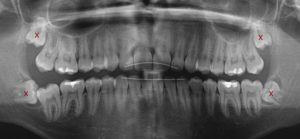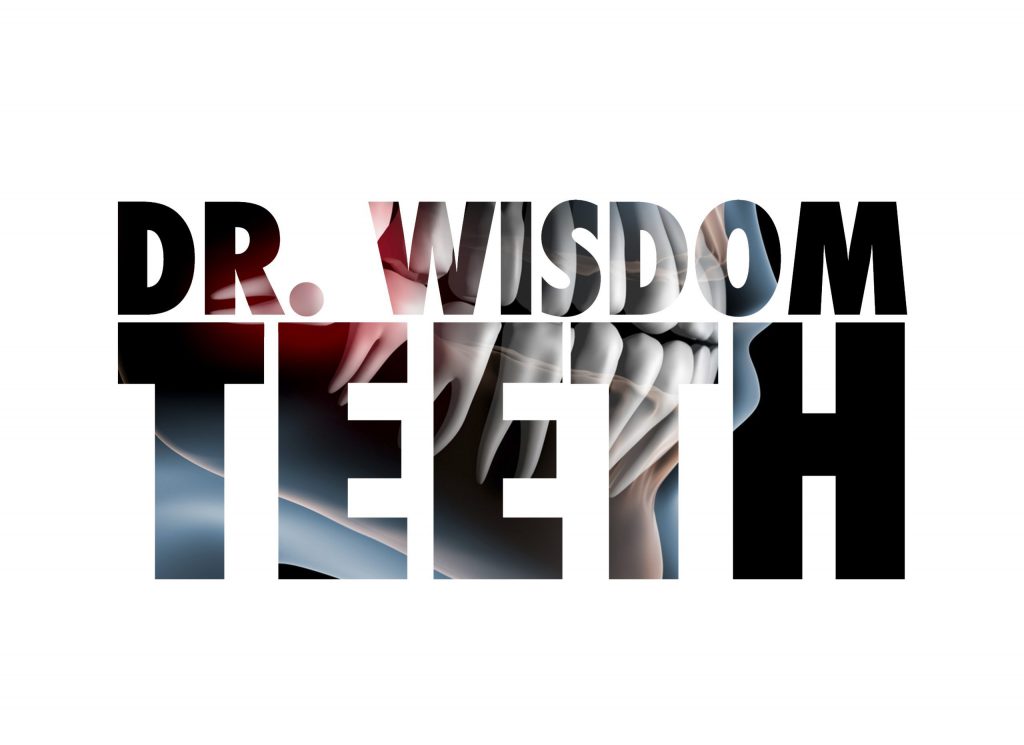resources
Recommended Age for Wisdom Tooth Removal
It is a standard of practice and highly recommended that patients in the age group 15 to 22 years of age get screened for possible impacted wisdom teeth. Wisdom teeth are the last set of teeth in our mouths to develop, and unfortunately are responsible for many dental problems. Impacted wisdom teeth may still be beneath your gums and not visible, and may even have no symptoms of pain or any discomfort.
We currently have the technology to screen patients using a panoramic radiograph, to establish the orientation and position of these wisdom teeth, and can often accurately predict whether there is sufficient room in our mouths to erupt properly. An impacted wisdom tooth often grows in the wrong direction, pushing on adjacent teeth, leading to crowding in the front (anterior) teeth. Impacted wisdom teeth can also eat away (resorption) and damage the roots of the adjacent teeth. If there is insufficient room for the wisdom teeth to break through the gums properly, these wisdom teeth can lead to very painful infections, that often necessitate antibiotics, and emergency surgical removal.
Wisdom teeth can also be associated with dangerous cysts (lesions) that damage the bone in the jaw. The early screening and detection of impacted wisdom teeth are very important, because it is often much safer to remove wisdom teeth that are partially developed, and only have short undeveloped roots. As the roots of the wisdom teeth develop and get longer, which occur during teenage years, they grow closer to important nerves and sinus space, making their removal a higher risk for complications. Early detection of impacted wisdom teeth and subsequent removal can save you a lot of pain and suffering, and reduce the risk of crowding of your teeth. The typical time to remove four impacted wisdom teeth is usually under 25 minutes, and can be done in-house, in our clinic by Dr. G. Shevket, DDS.
As part of our commitment to you and your family’s oral health, Dr. Shevket has opted to waive the cost of the consultation for your wisdom teeth diagnosis. Your panoramic radiograph will be screened by Dr. Shevket and he will let you know whether your wisdom teeth are impacted and if so, require removal or be allowed to erupt.
FAQs
Often radiographs allow us to see and predict the future. Your dentist may anticipate future issues as your wisdom teeth erupt. It is often much easier, and safer to remove wisdom teeth in your teenage years (15 -22 years of age), BEFORE your wisdom teeth roots are fully developed (grown to full length). Wisdom teeth that are not fully developed in your jaw are often easier to extract because roots have not developed or matured enough to anchor your wisdom teeth in the bone. It is not always a good idea to delay your surgery, if your dentist had deemed them impacted and require extraction.
A typical surgery often takes only 20-25 minutes for Dr Shevket to remove all four impacted wisdom teeth. Each surgical site usually receives couple stitches.
The length of time for recovery varies for each individual case and depends mainly on patient’s age, the complexity of the case, patient’s health, and compliance with post-operative instructions. Typically, most patients are able to carry on with their normal day-to-day activities with limitations on heavy lifting, and strenous exercise in about 3-4 days. Smokers, and older people could take much longer time.
NO. Wisdom teeth are only removed if they are symptomatic, or if we anticipate that it will cause future problems. Wisdom teeth that are erupted, and are in full function, and kept clean often do not require any extraction. If, however, your dentist diagnosed them as impacted, it is a good idea to have all four wisdom teeth removed in one appointment, rather than multiple appointments, as each extraction site heals independently of each other. So you only go through the recovery once for the same length of time for four extractions, as you would for one extraction.
Not everyone requires their wisdom teeth to be removed if there is sufficient room for these teeth to erupt properly. Unfortunately for most of us, wisdom teeth removal is often required for one or more of the following reasons;
- Insufficient room in your mouth will generally cause crowding as your wisdom teeth push their way through the gums.
- Incorrect angulation of the wisdom teeth can cause damage to the teeth in front of it. This is called “resorption”.
- Wisdom teeth erupting in the wrong area can cause an infection and an abscess.
- Limited accessibility to keep wisdom tooth clean can cause cavities on the wisdom tooth and the tooth in front of it.

If the wisdom teeth are impacted (no room, and/or angled), it would be best to extract wisdom teeth prior to complete root formation (even if patient is asymptomatic). This is often found in age groups between 15 to 22 years of age. By age 23 most people with wisdom teeth have complete root formation. It is usually much safer, and easier to extract wisdom teeth while still covered by soft tissue and bone before the roots are formed. The standard of care now is that every young teen should have a panoramic radiograph taken to assess the level of impaction of their wisdom teeth. If there seems to be no room for full eruption into function, then patients should be advised of the need to extract their wisdom teeth, even if they are currently asymptomatic. Some of the advantages of early intervention and removal of wisdom teeth are as follows:
1) Minimize the risk of crowding and malocclusion.
2) Reduce the possibility of resorption or damage to adjacent 2nd molar.
3) Eliminate the risk of pericoronitis (infection).
4) Eliminate food trap in the wisdom teeth area which could cause cavities in the adjacent tooth.
5) Removal of impacted wisdom teeth is much easier, and safer before roots are developed.
There is less likely to have complications, such as nerve damage or dry sockets in young patients.
6) Older patients (i.e 30+) take longer time to heal as bone’s ability to repair itself becomes less efficient as we age. There is also higher incidence of dry sockets, and other complications with older patients.
In the first 4-5 days post-surgery you may notice that the surgical sites are fully closed over by stitches (sutures) and there is no visible hole. After an impacted tooth is removed, the gums are often stretched to close this hole, to help protect the blood clot within the socket. It is very important for this blood clot remains in the socket, undisturbed. Eventually, the blood clot will give way to new skin formation along the lining of the walls of the socket (hole). As the new skin forms within the socket, the “old” stretched skin that was stitched closed over the holes, slowly pulls away. This is approximately 1-2 weeks post-surgery and coincides with stitches slowly dissolving and falling apart. DO NOT WORRY ABOUT ANY FOOD DEBRIS GETTING INSIDE THESE HOLES. Do not make any attempt to remove this debris with pressurized water inside the holes. The blood clot/new skin formation within the socket is very delicate and can inadvertently be dislodged in an attempt to remove food debris. This can leading to something called a dry socket ( a very painful complication). You may brush your mouth, and rinse with water/salt water or chlorhexidine 2-3 times a day, but you may not flush the debris within the sockets with pressurized water (i.e no water picks inside the hole).
It may be safe to use a monojet to flush out the holes with food debris only after 2-3 weeks of proper healing. But this is not necessary. Food debris within the socket gets dislodged naturally without any human intervention. The bone under the new skin slowly fills in pushing the new skin up and closing this hole. Moreover, the food trap that may develop after wisdom teeth removal is often temporary and will resolve naturally within the first 2-3 months post-surgery. This process may take 3-6 months for individuals who are older at the time of their wisdom teeth removal (30 years +)


